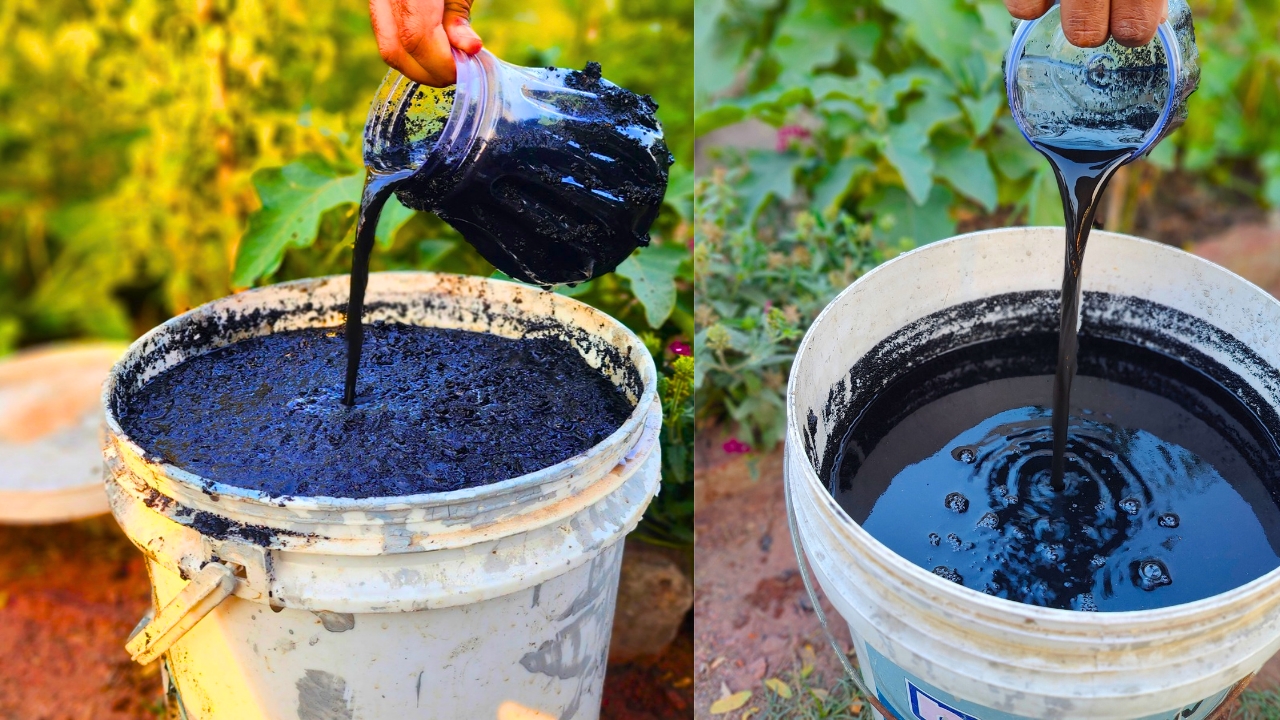Create a Miracle Growth Elixir with Biochar, Compost, and Compost Tea
Welcome to our site! Today, we’re going to disclose a secret recipe that will make your garden bloom like never before. We’ll walk you through making a potent concoction that improves soil health and fosters the growth of stronger, healthier plants. With the help of this unique mixture, your garden will become more robust and productive by increasing the soil’s ability to retain water and nutrients. Stay tuned to learn how to create this wonderful concoction at home and give your plants the best possible start! Now let’s get going!
Comprehending Biochar
The amazing soil supplement known as biochar is created by heating organic debris in a low-oxygen atmosphere. This procedure yields a porous substance that is highly effective at attracting and retaining nutrients, water, and advantageous microbes. You may maximize plant development and create a haven for healthy soil life in your garden by adding biochar.
Making the Mixture of Biochar
The first step will be to activate and create a liquid biochar mixture, which will significantly raise the quality of our soil. Now let’s get going.
Ingredients: 2 kilograms of compost 1 kilogram of biochar Compost tea (or non-chlorinated water)
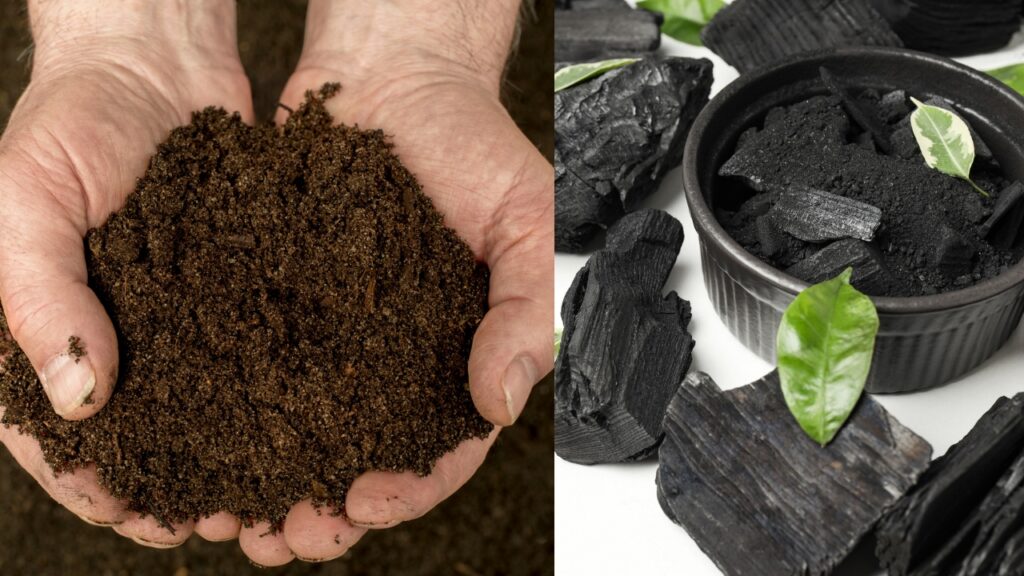
Method of Production:
- Firstly require approximately two kilograms of compost first, followed by one kilogram of biochar.
- Before using, crush them into little pieces.
- Thoroughly combine these ingredients.
- Rather than adding regular water, we will add compost tea to it to increase its potency. Use non-chlorinated water instead of compost tea if you don’t have any.
- After thoroughly mixing them, cover the 5-gallon bucket with permeable cloth and let it sit for at least three days—the longer the better.
The microorganisms are able to grow and colonize the biochar when the combination is allowed to sit for a few days, which increases the biochar’s effectiveness when applied to soil. This procedure, which is referred to as “charging” the biochar, guarantees that it is prepared to promote plant development right away after application.
Applying the Mixture
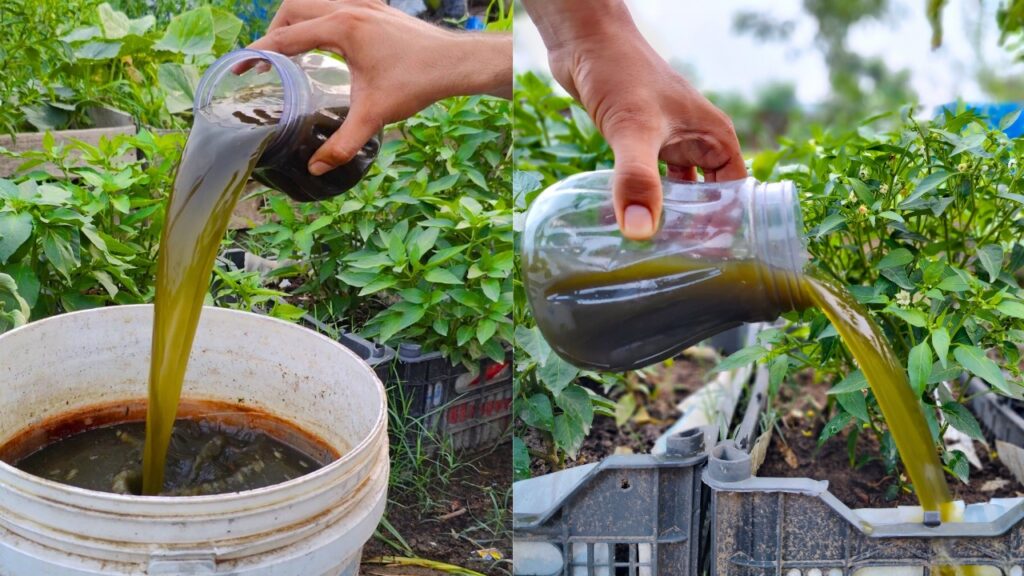
We waited seven days to stir our combination. You may observe how potent the mixture appears after 7 days. The combination can be used to feed your plants right now, but at the beginning of the growing season, it will make a wonderful addition to your garden beds.
- Water your bed first. The combination includes millions of microbes, and without water, they would perish.
- After watering, pour this great combination on top of the soil.
Benefits of the Mixture
By blending biochar with compost and compost tea, we generate a supercharged amendment for our soil. The biochar’s porous structure provides a great habitat for beneficial microorganisms, which are required for good soil and plant growth. These microorganisms help break down organic materials, making nutrients more available to plants. The compost adds organic matter and nutrients to the combination, while the compost tea brings even more beneficial microbes and nutrients.
We’ll explore further in detail about biochar and its four primary benefits for your garden. We’ll also address three commonly asked questions about biochar gardening and how to utilize it most effectively.
1.Soil Water Retention
The addition of biochar to plant soil enhances its ability to retain water due to its porous structure.
How?
Water is drawn into and retained by the pores in biochar, keeping it from leaking out of the pot or seeping into the ground. After that, the plants receive the water as needed, which lowers the soil’s water requirements and increases its resistance to drought.
This is especially helpful for sandy and silty soils, which have low water-retention capacities.
Thus, you may easily use biochar to increase the amount of water available for your plants if the soil in your garden is sandy.
2. Enhances the Health of Your Garden Soil
- This is how biochar enhances the health of soil:
- By improving the soil’s ability to retain water and nutrients, it improves soil fertility.
- By enhancing aeration and reducing soil compaction—the absence of space between soil particles—it strengthens the structure of the soil.
- It promotes the growth of helpful bacteria or soil microorganisms that break down organic materials into soil nutrients.
- It raises the cation exchange capacity of the soil, which is the soil’s capacity to hold onto and provide nutrients to plants.
- Because of its alkaline properties, biochar improves the pH of acidic soils by lowering soil acidity.
- Your garden soil becomes more conducive to plant growth as a result.
3. Enhances the Health of Plants
As we’ve just discussed, biochar enhances soil structure and aeration.
As a result, plant roots are able to delve deeper into the soil, receiving more nutrients and better physical support.
That’s not all, though.
Research indicates that certain plants, such as asparagus, tomato, pepper, and strawberry, can have their diseases suppressed by biochar. Plants grown on soil modified with biochar are therefore naturally healthier and more disease-resistant.
4. Facilitates Carbon Sequestration
Because biochar may sequester carbon, it can absorb atmospheric carbon dioxide, one of the main greenhouse gasses.
How is your garden helped by this?
Carbon dioxide is captured by biochar, which then stores the greenhouse gas in the soil for thousands of years as a stable carbon sink. This process helps replenish depleted soils and increases soil productivity.
Additionally, by lowering greenhouse gas emissions, this helps counteract the effects of global warming, such as the decrease in crop yield and soil moisture content.
This means that utilizing biochar in your gardening benefits both the environment and your plants.
Now let’s investigate the application of COMPOST TEA in gardening.
WHAT IS COMPOST TEA?
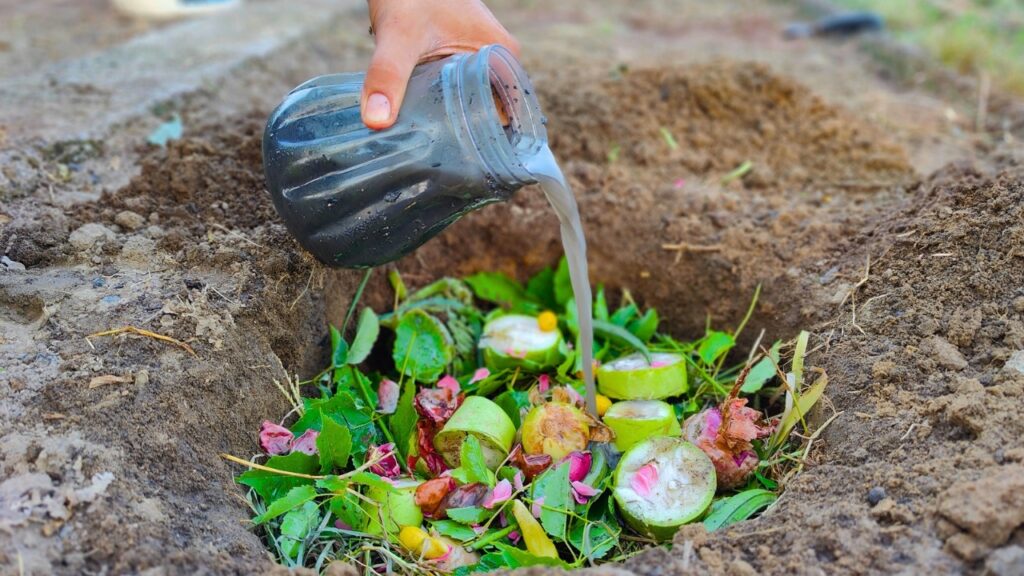
All compost tea is made of compost steeped in water. Soaking infuses the nutrients and microorganisms from the compost, including bacteria, fungi, protozoa, nematodes, and micro arthropods, into the water.
Compost Tea Benefits:
Compost tea is a fantastic way to improve the general health of plants; you may think of it as vitamins for plants. Consequently, robust plants are more resilient to illnesses and pests.
Advantages of Compost Tea:
- Enhanced soil health; less fertilizer is required when the soil is nutrient-rich.
- Enhanced soil water-retention capacity, which lessens the requirement for regular watering
- Enhanced soil structure: A soil’s structure is derived by its biological constituents. All of the food web’s organism categories, including bacteria, fungus, protozoa, nematodes, and micro arthropods, are necessary for healthy soil structure. You are introducing these bacteria by drinking tea.
- Increased root growth in plants; larger roots better hold moisture and lessen runoff
Should I Use Compost or Tea?
The similarities between real compost and teas manufactured from it frequently cause confusion. Many individuals think that the decision is between the two. In actuality, a farm benefits most from both ways. Compost in its raw state provides structure to the soil in addition to recycling nutrients.
This helps protect fields from erosion and makes irrigation considerably more effective. Teas are created directly from compost, therefore they have the same applications. Mainly the benefits of utilizing compost tea are the nutrition and water together. When developing an on-site organic fertilization system, use both methods together for optimal outcomes.
Things to think about before using biochar
Applying Straight’ biochar (and biochar-containing composts)
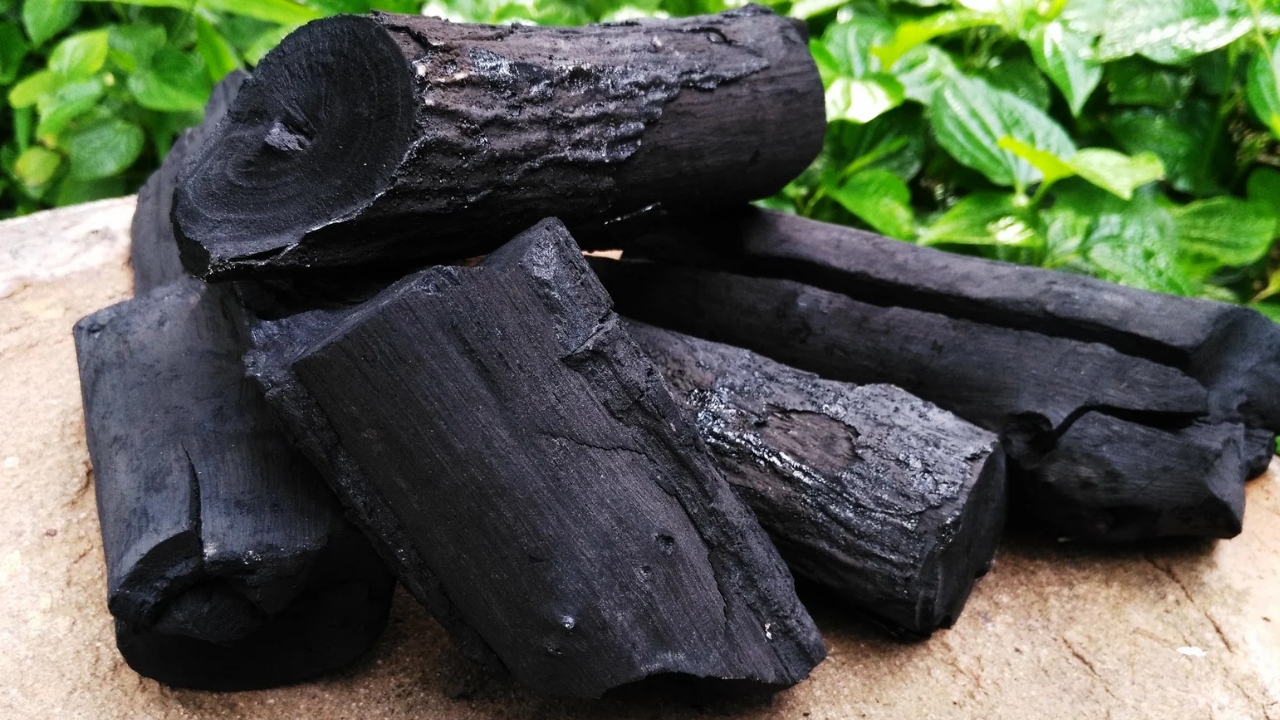
“Straight” biochars (non-enriched) work best for aerating (also known as “drainage”) soils that are too dense or anaerobic (such as poorly structured/compacted clays) or soils that are susceptible to periodic flooding. It can be buried in the ground, blended with soil “backfill,” or used at any time of year for planting purposes. It’s important to adhere to the application rates suggested by the manufacturer, just like you would with any soil improver.
In general, gardeners should make sure there is a sufficient air supply throughout the rooting zone, just like with any other soil management (save for purposefully marshy areas or aquatic plantings)
Generally speaking, sandy soils have better air-flow characteristics than clay soils. Straight porous biochars, such as those made from soft or hardwood woods, have a high chemical stability that makes them excellent soil physical conditioners for enhancing air movement or lowering the bulk density of heavy soils. Because traditional organic growth media can quickly disintegrate, compact, and contribute to the three primary greenhouse gasses of carbon dioxide (CO2), methane (CH4), and nitrous oxide (N2O), biochar can be preferable to composts (and especially peat!) in this regard.
In addition, leftover fertilizer nitrogen (N) can be converted into nitrous oxide, a greenhouse gas 300 times more potent than carbon dioxide.
I appreciate you viewing, and I hope this video will assist you in growing a more fruitful and long-lasting garden. For more gardening advice and lessons, don’t forget to like, share, and subscribe!
Climate change and biochar
Because biochar takes a very long time to break down—hundreds or even millennia—compared to other typical types of organic matter like garden compost, it has a lot of potential to store carbon in the soil. Enhancing the structure (aeration) of dense, poorly drained soils may have additional advantages since these soils are otherwise susceptible to producing large amounts of greenhouse gasses (GHGs), including nitrous oxide (N2O), carbon dioxide (CO2), and methane (CH4).
Similarly, we expect that adding biochar to compost piles will aid in lowering methane and nitrous oxide emissions. To assist in examining and quantifying these factors, we are looking for collaborators and research funds.
When it comes to carbon accounting, it’s critical to understand that the production and distribution of biochar have an impact on whatever potential value it may have in sequestering carbon. When created under properly regulated conditions using dry “waste stream” organic materials, where the resulting heat, bio-oils, and gasses are used as fuels, etc., its production is seen to be most sustainable.
A word of caution regarding climate change: although the use of biochar can aid in the removal of CO2 from the atmosphere, more extensive societal and lifestyle changes (such as bettering eating and travel habits) are required.
This is due to the fact that, as of 2020, no practical method of removing CO2 has the ability to store carbon as effectively as untapped fossil fuel sources. In order to mitigate climate change, the most crucial goal is to avoid burning fossil fuels.
Frequently Asked Questions
Is it possible to make charcoal or biochar at home?
A: It is not advised to produce charcoal or biochar at home without specialized knowledge and equipment. The procedure is risky (heat and glasses), and it can be challenging to regulate every aspect. The temperature and pyrolysis duration have a major impact on the finished biochar’s quality. Wet wood can have surprising effects. Unburned smoke contains carbon monoxide (deadly) and methane (accelerates climate change). Responsible manufacturers guarantee that methane does not leak into the environment. Always follow manufacturer’s requirements and buy responsibly sourced products of verifiable origin.
Can I use residual charcoal from my wood burning stove?
A: No, it might include dangerous substances or microplastics. Furthermore, using any partially burned or charred waste may be hazardous or cause the soil to lose nitrogen as it breaks down.
Is it possible to substitute barbecue charcoal for biochar?
A: Not at all. The quality of barbecue charcoal varies and ought to be avoided. Distinguishing between woody charcoal and barbecue briquettes can be challenging. Coal, tars, resins, and other contaminants are examples of contaminants or additives found in modern barbecue briquettes that should not be added to soil. When cooled, ash from grills using briquettes should be disposed of as household waste since it contains pollutants called poly aromatic hydrocarbons, or PAHs.
Does biochar require reapplication and is it a source of nutrients?
A: The nutritional value of biochar is limited, although in sandy soils, some salts (K+, Ca2+, and Mg2+) can have an impact. One application is typically sufficient for biochar; however, it should not be used in place of fertilizer (the rate of application should be checked on the biochar packaging). It is best to apply extra nutrients as fertilizer if they are needed on poor soil. The primary purpose of biochar is to create a physical environment that promotes an aerobic, healthy soil ecosystem, which tangentially improves plant health and vigor.
Does adding biochar change the pH of the soil?
A: It certainly can. The pH range of biochars is determined by various factors, such as the origin of organic matter and the method of manufacture. For application rates that are unique to your circumstances, always refer to the manufacturer’s recommendations. These should take into account the pH of the existing soil as well as the pH of the plant’s preferred soil.
Can You Fertilize Biochar?
Biochar is not a fertilizer, sorry.
However, it lessens the requirement for applying chemical fertilizers.
How?
Biochar promotes soil fertility, leading to better soil water and nutrient retention. It also increases the establishment of helpful soil bacteria that boost plant nutrition availability.
As a result, biochar treated soils require less fertilizer application.
Why is this important?
Reduced utilization of artificial fertilizer helps reduce water contamination and changes in soil pH, making your garden a healthier home for plants and soil microbes.
Moreover, chemical fertilizers have a huge carbon footprint!
You can truly offset your carbon footprint by utilizing biochar.
Can Biochar Be Replaced with Barbecue Charcoal?
Despite being a type of charcoal, biochar cannot be substituted with other types of charcoal, such as barbecue charcoal.
This is the reason why:
High-temperature pyrolyzed wood or plant material is used to create biochar, which is useful for water filtering, gardening, and other applications.
Unlike biochar, barbecue charcoal briquettes may contain impurities or components (such as tar, resins, and dangerous compounds) that have an adverse effect on soil biology.
However, compared to biochar, BBQ charcoal briquettes have a lesser surface area since they are made by pyrolysis at lower temperatures, much like wood ash. It therefore lacks the same capacity to retain water and nutrients.
Is Composting Easier With Biochar?
For gardening, both compost and biochar are beneficial, but none can take the place of the other.
Because of its huge surface area and porous structure, biochar is a great soil supplement that helps retain water and nutrients in the soil. Additionally, by raising the carbon content of the soil, it enhances soil quality.
Conversely, compost is useful since it contains beneficial soil bacteria and microorganisms as well as nutrients. It is particularly helpful in raising the nitrogen level of the soil.
But you’re not forced to pick one over the other.
Plant growth and soil health are significantly enhanced when biochar is combined with compost, or activated alongside it. Additionally, research has indicated that when combined, they improve the soil’s availability of potassium, phosphorus, and nitrogen nutrients.

